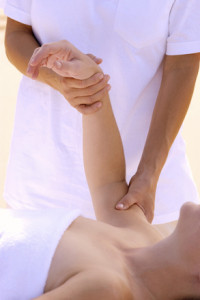There’s no denying that massage feels great. But have you ever stopped to wonder why? If so, you’re not alone. Our clients are naturally curious; they question how an hour under a talented Licensed Massage Therapist’s touch can provide such profound healing. To satiate your inquisitiveness, we’re examining the “science” of massage through five common questions our massage therapists often receive from patients.
Massage Therapists in Portland Answer 5 Common Questions about Massage
1. Why should I drink water before and afterwards?
 It’s a classic massage therapist adage—“Drink lots of water!” While there is little formal research answering this question, we can understand why hydration is key if we understand how soft tissue manipulation works on a basic level. So-called “knots” are adhesions caused by overworked muscles. Circulation and metabolic waste removal are less effective in these constricted areas. Therapists soften these adhesions, improving circulation and waste removal while also releasing toxins into the bloodstream. (These toxins come from multiple sources, such as pain pharmaceuticals.) Water helps flush these toxins out of your body. Post-massage dehydration can also muscle soreness later on, so it’s best to drink plenty of water before and after a massage session. Finally, massage often stimulates the body’s metabolic and filtration processes, which are eased with plenty of water.
It’s a classic massage therapist adage—“Drink lots of water!” While there is little formal research answering this question, we can understand why hydration is key if we understand how soft tissue manipulation works on a basic level. So-called “knots” are adhesions caused by overworked muscles. Circulation and metabolic waste removal are less effective in these constricted areas. Therapists soften these adhesions, improving circulation and waste removal while also releasing toxins into the bloodstream. (These toxins come from multiple sources, such as pain pharmaceuticals.) Water helps flush these toxins out of your body. Post-massage dehydration can also muscle soreness later on, so it’s best to drink plenty of water before and after a massage session. Finally, massage often stimulates the body’s metabolic and filtration processes, which are eased with plenty of water.
2. What are the short and long term physiological effects of massage?
In the short term, you may feel refreshed, relaxed and balanced. You may also feel more graceful, or lighter, as your overall nervous system functioning enjoys a boost. Massage also stimulates the circulation of blood, facilitating cellular processes such as nutrient uptake and waste removal. The lymph system benefits from massage as well; this is one of your body’s main systems for immunity. As the nervous system relaxes, and unnecessary tension melts away, you will likely feel more energized, as energy that was being wasted on holding tension is now available. For the muscles, massage can relax excess tension or help stimulate those that are chronically relaxed (i.e., lacking tone). Massage can help reduce imbalanced pulling on the bones, for postural integration. For the digestive system, massage encourages relaxation and improved elimination. It can also improve skin health, and balance hormonal responses.
3. Can massage help the body heal?
Our skin is incredibly sensitive, and we evolved to receive touch regularly. Specialized neurons and cells detect touch and pain. Because massage feels so good, it helps us heal. Gentle touch can be very effective for healing; one study from the University of Illinois at Chicago found that gentle touch helped reduce excessive gripping, a common experience of MS patients. Another study from an Iranian neonatal intensive care unit found that gentle touch and massage increased sleep while minimizing fussiness in infants. These are just a few examples of how massage can help us heal ourselves. Of course, there are many more, which we will explore in a future article.
4. How does massage affect the body neurologically?
Massage impacts the nervous system via nerve endings in the skin. According to a study in the Journal of Alternative and Complementary Medicine, massage also impacts the balance of hormones and other neurotransmitters. Massage reduces the presence of arginine vasopressin (AVP), which tightens blood vessels, raises blood pressure, and halts urine secretion, all aspects of the body’s stress response. The same study suggested that massage reduces levels of the stress hormone cortisol, while increasing feel-good hormones, such as oxytocin. Finally, these researchers hypothesize that massage increases the presence of lymphocytes, white blood cells that battle cancer. The study’s authors concluded that the “measurable biological effects” of massage suggest that it may be used to treat other inflammatory conditions, including autoimmune disorders.
Massage also activates vagus nerve, which is the primary nerve of the parasympathetic nervous system. This is the “rest and digest” system, also known as the relaxation response. When the vagus nerve is active, the body is healing itself.
5. Why do I feel so relaxed after a massage?
Many therapists will tell you their clients look different before and after massage. There’s a different light in the eyes, the body seems more balanced and relaxed, and the whole person seems more at ease. There are several scientific reasons for this transformation and one of them is what soft tissue work does for the connective tissues in your body. Some connective tissue is structural (i.e. bone). Protective fascia wraps around every bone, muscle, and joint. The skin is truly ubiquitous, and the largest single organ in the body. Connective tissue provides structure for every cell, while also creating a liquid/gel matrix in-between cells.
One of connective tissue’s main jobs is to repair torn muscles, broken bones, wounds, and other injuries. It is an incredibly strong tissue that has a tensile strength of about twenty-two hundred pounds per square inch. So it’s very helpful for supporting new ways of using your body. If you start weight-lifting, special connective tissue cells called fibroblasts will be sent to build collagen (another connective tissue cell) to the lines of tension used in your sessions pumping iron. The body will intelligently add new tissue according to how you use your muscles.
However, this also applies to abnormal lines of tension, such as the slumped shape of working at a computer desk. Connective tissue will support your most common postures, even if those postures are imbalanced. This can create collagen buildup, and over time that collagen can become so bonded that it’s impossible to loosen it through exercise or stretching. A massage therapist can use heat, pressure, and shearing strokes to loosen collagen bonds. (“knots”). This creates an extreme state of relaxation as the connective tissue softens, and the whole matrix of connective tissue in the body responds.
Heart Spring Health’s massage therapists provide multiple Portland massage therapy options, including several massage modalities. We offer Shiatsu massage, abdominal massage, structural integration, therapeutic massage, craniosacral therapy, and more. Regular massage is one of the best things you can do for your health. Contact us today for more information on our Portland massage services, and how massage can fit into your overall plan for natural health.
[Photo by dcarson924 via FreeImages.com]




